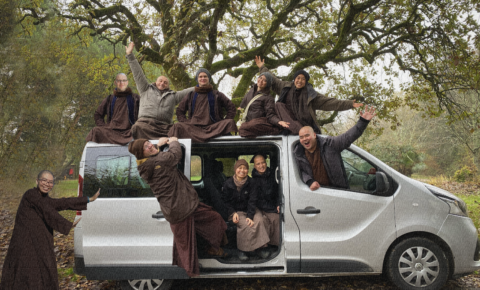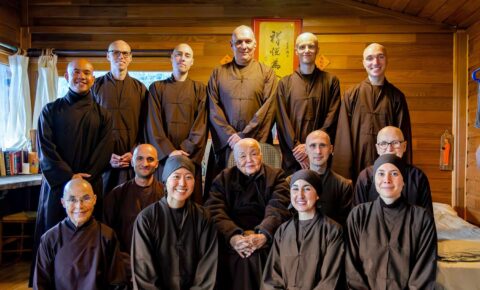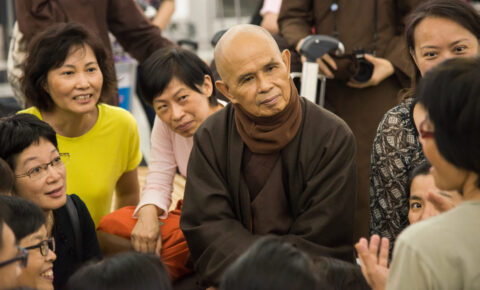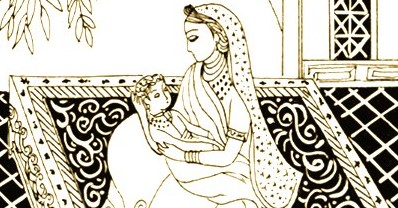
by Thich Nhat Hanh
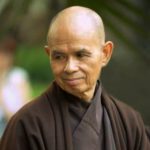 Queen Mahamaya had a very easy labor when she gave birth to Siddhartha. On the way to her parents’ home to give birth, she and her entourage stopped to rest in the Lumbini garden. While taking a walk in the garden, she felt the moment of birth coming. She held onto a branch of the Aśoka tree and, while standing, gave birth to Prince Siddhartha. Her attendants promptly received and cared for the baby with the necessary equipment. After giving birth to Siddhartha, Queen Mahamaya returned to Kapilavastu. Some attendants were sent home before her to inform both maternal and paternal sides of the family of the good news.
Queen Mahamaya had a very easy labor when she gave birth to Siddhartha. On the way to her parents’ home to give birth, she and her entourage stopped to rest in the Lumbini garden. While taking a walk in the garden, she felt the moment of birth coming. She held onto a branch of the Aśoka tree and, while standing, gave birth to Prince Siddhartha. Her attendants promptly received and cared for the baby with the necessary equipment. After giving birth to Siddhartha, Queen Mahamaya returned to Kapilavastu. Some attendants were sent home before her to inform both maternal and paternal sides of the family of the good news.
When Yasodhara gave birth to Rahula, Siddhartha’s son, she encountered, however, a lot of difficulties. It was a prolonged labor. At times, it was feared that mother and son would not be able to make it through those hardest moments. The royal family, including Siddhartha, were extremely worried . The collective energy of anxiety was so great that it spread throughout the whole palace. Fortunately, Yasodhara finally gave birth to Rahula. We can see that, during Yasodhara’s pregnancy, Siddhartha was unsettled and had a lot of anxiety. He was unable to be happy in the present moment. Experiencing suffering himself, witnessing the suffering of the royal family as well as that of the people in his country, it was not possible for Siddhartha to enjoy all the favorable conditions of a luxurious and comfortable life. Yasodhara was aware of Siddhartha’s afflictions, yet she did not know how to help him. The suffering in Siddhartha’s heart had also penetrated into Yasodhara, as well as the baby Rahula. Her difficult childbirth was partly due to this reason.
That ordeal of childbirth, in some way, contributed to Siddhartha’s decision to leave home in search for his spiritual path. Yasodhara understood and accepted this.
Lucky for all of us, Siddhartha was successful. His success was also a great success for humankind, similar to when Neil Armstrong put his first step on the moon. He declared that it was a great step for humankind in the field of science and technology. Siddhartha succeeded for all of us. Siddhartha found a way to help us handle our suffering, to generate peace and happiness in our daily life, to overcome the bonds of fame, wealth, power and sensual pleasures; as well as to touch the nature of no birth no death of all existence.
Today we celebrate the appearance of Siddhartha on this planet. However, the majority of us only worship Siddhartha as a supreme sacred power with the ability to bless and to protect us from danger. Not many are able to walk the path he has walked, to handle suffering, generate happiness, reestablish communication and touch Nirvana in the present moment. Our Buddhism of today mostly is a Buddhism of devotion. What the Buddha advised us—to let go of such things as fame and sensual pleasures—we now ask him to grant us.
Practicing mindfulness, concentration and insight, walking the Noble Eightfold Path as the path of happiness in the present moment, has become only a very small part of Buddhism as it is practiced today. We did not inherit the most precious parts of the spiritual heritage that Siddhartha left. Our Buddhism has become corrupted, unable to play its original role. We need to put all our heart into renewing Buddhism, so that it can continue to play its role in generating peace for individuals, families, countries and societies. By only practicing devotional Buddhism, bowing our heads amidst incense all day long, we will not able to do that—and not be worthy to be called descendents of the Buddha—the Great Conqueror of Afflictions.



